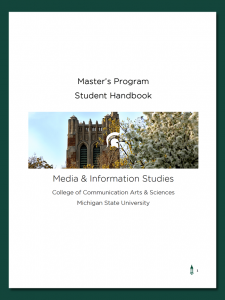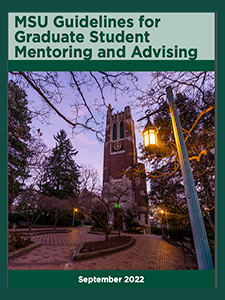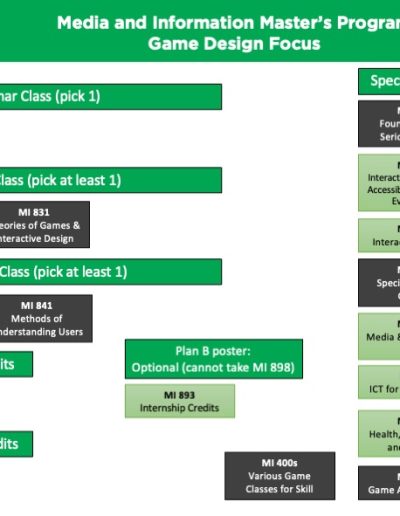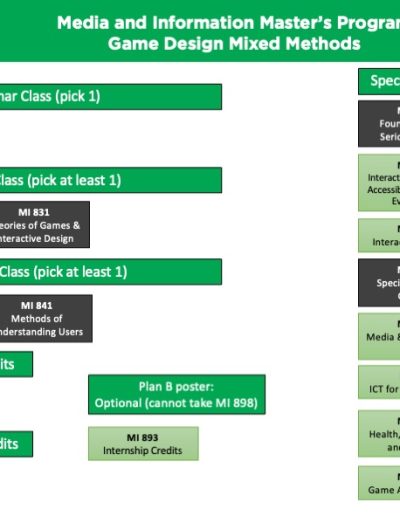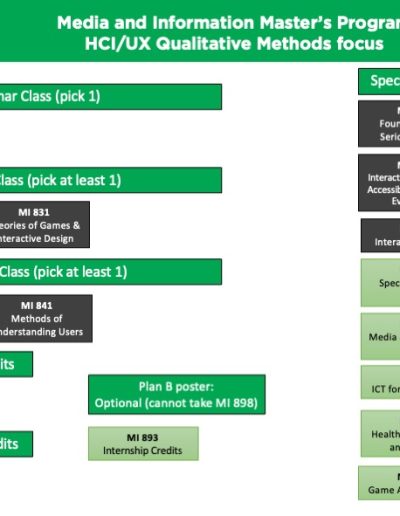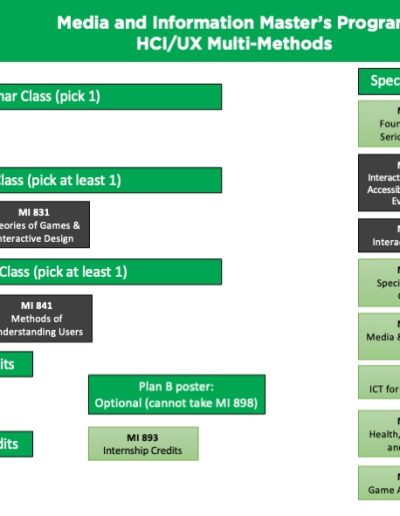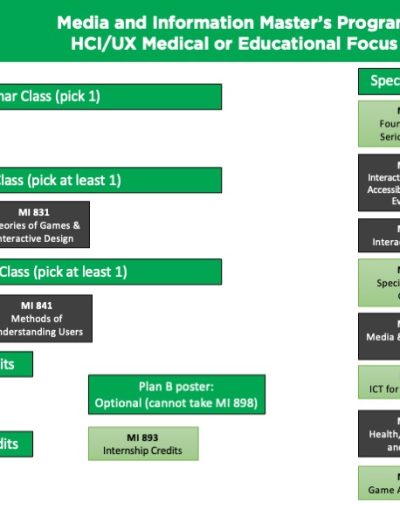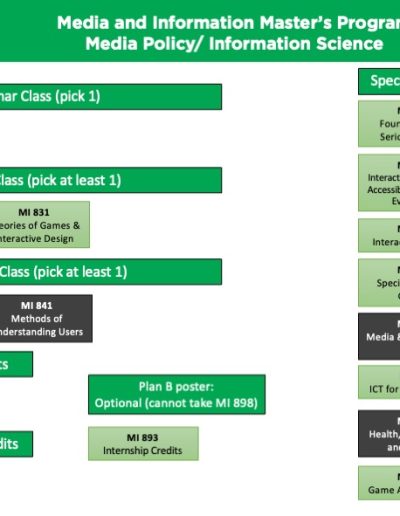Media + Information
Faculty Resources
Resources
This page has resources for faculty and staff. All guidelines are subject to the by-laws of the Media & Information department. Please contact the MA director Ruth Shillair, or our APC Jessica Fischer if you have any questions.
Advising Graduate Students
Thank you for supporting our students. Mentoring students makes a permanent difference in their lives.
Students are assigned an initial advisor based on faculty match to the student’s declared goals based on their application and faculty availability to mentor. This is based on our records of being primary advisor for master’s students.
Basic expectations are:
- First semester- meet with student, review their plan of study, offer your insights and expertise on preparing for their career goals.
- Second semester- review and sign yearly advising form
Often after the first or second semester, student might change primary adivsor based on their project or thesis
- Second – Third semester- meet with student to discuss project proposal, review progress and offer advice. Attend proposal meeting and defense meeting, sign final papers.
The Basics
Students are given these three documents at orientation.
Academic Handbook
The academic handbook is your guide to the M&I master’s program. Students should review this yearly. This includes policies and procedures for completing all the elements of your degree. Click here to access the student handbook.
Plan of Study
This is a customized plan that helps you to complete all the basic requirements to complete their degree. There is a great deal of flexibility in the program and yet guidelines to ensure excellence and training in research skills. Click here or on the image below to download the latest Plan of Study Form.
Initial Guidance
Classes to recommend based on the student’s goals
Class recommendations based on student goals
In the new program, all students must take one theory class, one methods class, one seminar class, three specialization classes, and 4-6 credits of thesis or project credits. Those who are doing a poster (oral examination) do not take project or thesis credits. Normally, these students have internship credits. In the following slides, the black classes are the ones generally recommend student enroll in for the different focus areas.
Click here to download the PPT with class recommendations. Students can also take the MI 400 level classes as electives to gain specialized training. They will have to apply for the CAS override, please contact Jessica Fischer, or the director Dr. Ruth Shillair for the link.
Click on the images below to enlarge.
Special Case Classes
MI 400 Level Classes and Classes from other Departments
Sometimes students benefit from a MI 400 level class, an 800 level class from a different department, or an independent study.
- Students must have at least 16 credits from MI 800 level classes.
- A student can have up to 30% of their credits from either shared UG/G classes, other departments, or a transfer from another university (upon review and approval of classes).
- Transferred classes must have a 3.0 or higher.
For students to take MI 400 level classes, they must fill out a form requesting an override request through the CAS college.
To start this process the student must have browser logged into your MSU identity and go to CAS Override > New Request
Independent Study
Sometimes a student may have a specific professor they want to study with or to take some of the content from an undergraduate class (e.g., MI 200 or MI 300) and add graduate level components. This is where our graduate program can really shine-you design the class with the professor to maximize your challenge. Enrollment is through our APC (academic program coordinator Jessica Leadbetter. Fill our the form and contact her.Download the form here. The faculty member should help set up expectations and reason for study. Then send to MA director and APC for enrollment.
Yearly Progress Reports
Once a year your students need to evaluate their progress and meet (virtually is fine). The students fills out the first section. The second section is for the instructor to fill out. This does not need to be in great detail, but it is a opportunity for students to touch base with their instructors. If you have any concerns about a student’s progress, this is a good time to reach out to the MA director. The student gets a copy of the progress report and uploads it into their Grad Plan.
 |
 |
Plan A students download the form here
Plan B student download the form here
Research Funding and Support
Funding
We have support to help students present their research in academic venues, such as conferences. The resources vary by year and are distributed by the Graduate School. We also have limited funding to help with direct research expenses. See the categories below, please contact the director of master’s studies, Dr. Shillair, if you have any questions.
Funding for research projects
We have funding for research projects that contribute towards your capstone master’s project or poster, your thesis, or for research tied to your studies.
Funding requests for research project expenses
When completed send to Jessica Leadbetter and Dr. Shillair.
Funding for emergencies
We have limited funds to help with emergencies- these are defined by the Graduate school- The student sends application to the director of the MA program FIRST to apply for the funds from the Graduate School. The department is expected to cover half of the expenses and the graduate school helps with the other half.
Emergency Expense Funding form
Funding for conference travel and registration
Funding is to help students who are presenting at a conference. If there is available funds, student may also be supported to go to important trade conferences.
These forms are for both MA and PhD students in our department
The student should work with our department’s travel agency and Kim Williams for making travel arrangements. If there are cancellations to conferences travel costs can be refunded to the student IF booked through our travel resources.
Regardless of arrangements, the students must register your conference travel with Kim Williams as this impacts travel insurance and emergency support.
Read this 1st for travel funding guidelines
Travel Funding from MI department request
Travel Funding Grad School application
Payback agreement
Council of Graduate Student Funding Opportunities
Scholarships
We have many substantial scholarships funded by our generous alumni. These support outstanding students that are focused on specific goals. Application period is usually January to early February and they are awarded to students for the following year. Students can apply for more than one scholarship. Click here for more details.
Mental and Physical Health Support
Counseling & Psychiatric Services
We have many resources available to help support our students.
We encourage you to remind students of CAPS (Counseling and Psychiatric Services). Students can get CAPS counselors https://caps.msu.edu/
CAPS connect is a free confidential service that students can use to get guidance for their next step https://caps.msu.edu/services/CAPSConnect.html
The College of Communication Arts & Sciences has a CAPS connect counselor in the college one day a week (Fridays from 10-12) for in person sessions https://caps.msu.edu/services/CAPSConnect.html
Office of Student Support & Accountability
This site has the process for reporting violations of academic integrity https://ossa.msu.edu/
If you have concerns about the well being of a student, either a behavioral issue, or any other concern you can refer them to the Care and Intervention Team https://ossa.msu.edu/cait .
The OSSA has a tool called the “Green Folder” to help you quickly evaluate the next steps to help a student.
Finishing
Steps to Complete Master’s Thesis/ Capstone Project/ or Oral Examination (Poster)
This is a copy of what the students have to show the steps to complete their master’s degree. Most of our students choose projects as this results in an artifact that students can add to their portfolio and support them in getting positions in industry. Those who want to go on to a PhD program usually choose to do a thesis as this can demonstrate their writing abilities better. Those who choose a poster (oral examination) usually base this on a rich internship experience, or for those who already have full time employment.
Plan A Thesis
Students doing the Plan A thesis track are often going on to pursue a Ph.D. or work where a detailed example of their skills in research and communication are desirable.
The thesis is a published document that demonstrates high standards of writing as it becomes a public document, available to other researchers and citable. You will work with the steps outlined by the Graduate school to properly format your thesis and submit it for publication through ProQuest.
The steps of a thesis-
1. Talk to your primary advisor about your research idea and narrow it down. Work on a proposal idea. Once you have a proposal developed contact two other professors to make up your committee. A thesis committee requires three authorized members. Submit your proposal to them for review and set up a proposal defense date. There are rules for the composition of your committee. Click here to see a listing of our faculty and their eligible positions on committees.
2. Present (defend) your proposal to your committee. They will provide feedback and guidance on your thesis. Once you finish your defense, have the committee sign the thesis proposal defense form (click here to download).
3. If your research uses individuals, either for surveys or interviews you need to get IRB approval. Talk to your advisor to start this process. Here is a link to a document to guide you in making your IRB document.
4. Once your research is approved, complete your research and finish writing your thesis. Work closely with your advisor and set up a time to defend your thesis.
5. Present (defend) your thesis to your committee. Once your have completed any requested revisions satisfactorily, then your committee will sign your thesis defense (click here to download).
6. Submit your signed thesis defense form to the master’s program director. Submit your approved thesis to the graduate school following the formatting guidelines.
Plan B Project
Students doing a Plan B project are often preparing for work in business or industry. The project produces an artifact that is often useful as a portfolio piece for getting a job in industry/ business.
The steps for a Plan B project-
1. Talk to your primary advisor about your project idea and discuss the proposal and timeline. Once you have a proposal you can reach out to get one more committee member. The project committee needs two members. Submit your proposal for review to both committee members and set up a proposal defense date. MSU has specific requirements for committee composition- click here to see the document to guide your selection.
2. Present (defend) your project idea to the committee. They will provide feedback and guidance on your thesis. Once you finish your defense, have the committee sign the project proposal defense form (click here to download).
3. If your research uses individuals, either for surveys, interviews, or usability testing, you need to get IRB approval. Talk to your advisor to start this process. Here is a link to a document to guide you in making your IRB document.
4. Once your research is approved, complete your research and finish writing the presentation of your project. Work closely with your advisor and set up a time to defend your project.
5. Present (defend) your project to your committee. Once your have completed any requested revisions satisfactorily, then your committee will sign your project defense form (click here to download).
6. Submit your signed project defense form to the master’s program director.
Plan B Poster
Students doing a Plan B Poster (Oral Examination). Students that already have a job lined up, or have a research artifact from an internship might chose the poster as this provides demonstration of research skills.
The steps for a Plan B poster
1. Talk to your primary advisor about your poster idea and discuss your timeline. Often students will make posters to demonstrate the work they did in an internship. The poster is similar to those presented at an academic conference. The poster does not need a committee. Once you and your advisor agree on the poster content fill out and submit the poster proposal form (click here to download).
2. If your research uses individuals, either for surveys, interviews, or usability testing, you need to get IRB approval. Talk to your advisor to start this process. If the research is performed as part of your normal internship activities you will probably not need IRB approval. Talk to the master’s program director if you have questions as each situation is unique. Here is a link to a document to guide you in making your IRB document.
4. Once your research is approved, complete your research and finish making your poster summarizing your work. Work closely with your advisor to make sure it is satisfactory.
6. The last week of classes each semester we set up a time and day where students doing the oral examination present their poster. They have about 15 minutes to explain their research and an additional 10-15 minutes to answer questions from the poster judges. The student can present the poster via conference video, but the student must be live to answer questions.
7. Submit your signed poster defense form (click here to download) to the master’s program director.
Finishing
If you are supervising Graduate Learning Assistants or Graduate Research Assistants (GLA, GRA) they are paid hourly. These are assigned by the chair of the department working with the APC and Graduate Director. They can assist in classes and help with grading assignments and tests. They can also help students with technical challenges. Please contact Jess Fischer for more details if you are not sure if a GLA is supposed to perform a specific task. If you are supervising GLAs or GRAs always be careful that they are performing the task for which they are hired.

